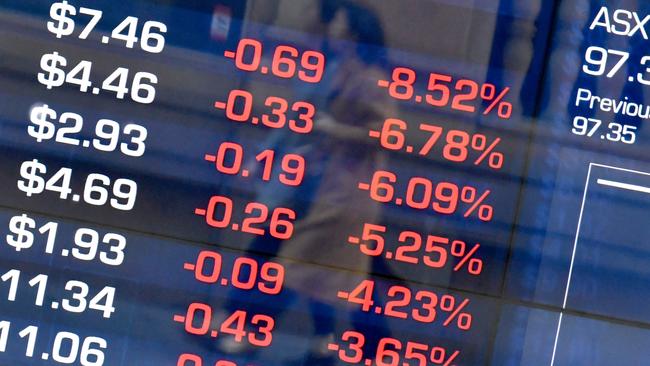Bankers keep calm and wait for debt markets to recover
Senior bankers and directors are keeping their cool despite a near-evaporation of funding deals in global debt markets.

Senior bankers and directors are keeping their cool despite a near-evaporation of funding deals in global debt markets, believing business will resume once the scale of the crisis posed by the coronavirus becomes clearer.
“It’s risk-off until then,” one banker told The Weekend Australian. “But if things do go pear-shaped, we’ll look back in 12 months and see that a lot of companies went bust because supply chains were disrupted and revenue slumped by 30-40 per cent over two to three quarters.
“That will hit the banks’ bad debt lines and be a challenge for the industry, but it won’t be because we were unable to fund ourselves.”
As equity markets swooned this week and debt investors sat on the sidelines, there were scenes reminiscent of the 2008 global financial crisis.
High-grade bond offerings from US banks evaporated and European debt bankers on Wednesday had their first day without a deal since the new year kicked in.
Meanwhile, the US junk bond market for companies rated below investment-grade — which has been running hot for years because of the insatiable global appetite for yield — suddenly went quiet.
It was an unsettling experience for one prominent director, who witnessed the damage wrought by dislocated funding markets in the GFC.
“But having lived through the crisis, which was a year-and-a-half of the world about to end, I’m not feeling it this time,” the director said.
“Technically this is a pandemic and the coronavirus is extremely contagious, but in a sense it’s only the flu.
“The markets are at very stretched levels so any uncertainty will provoke an over-reaction on the downside, and that’s what you can see is happening — no intermediary is going to price a deal in a competitive way while there’s so much uncertainty.”
The longer-term problem was the lack of any policy ammunition to stimulate the faltering economy.
“You have interest rates at or near zero, and that’s an issue — you’re dosed to the eyeballs on heroin every day and you’ve now got a global pandemic,” the director said. “What can you do for stimulus?”
A major-bank director said the big unknown was how long the crisis would last.
While not an “Armageddon” event, it was still cause for deep concern.
“You can imagine a scenario where it will be under control in a couple of months but you can also see it continuing for six months or more, and the problem is you don’t have any idea which one it’s going to be,” the director said.
“So that’s what makes it different: you don’t know the length or the breadth of it.
“Businesses have contingency plans for identifiable and quantifiable events but this one is neither.”
ANZ Bank said on Friday it was closely monitoring the virus outbreak and taking guidance from governments and the World Health Organisation.
A group situation management team had been convened on January 28 to centrally co-ordinate the bank’s response, with staff who travelled through virus hot spots going through a period of self-quarantine.
ANZ also contacted customers more likely to be affected by the economic impact of the coronavirus, with a range of support measures available including suspended interest payments and provision of additional credit.
As a group, the major banks are ahead of the game in their wholesale funding programs, which is a further point of difference with the GFC.
A greater proportion of their funding also comes from less volatile customer deposits.
The other significant point of difference, according to a senior banker, is that credit growth has at least halved from the GFC level of 7-8 per cent.
With less lending to fund, the call on debt markets is more restrained.



To join the conversation, please log in. Don't have an account? Register
Join the conversation, you are commenting as Logout